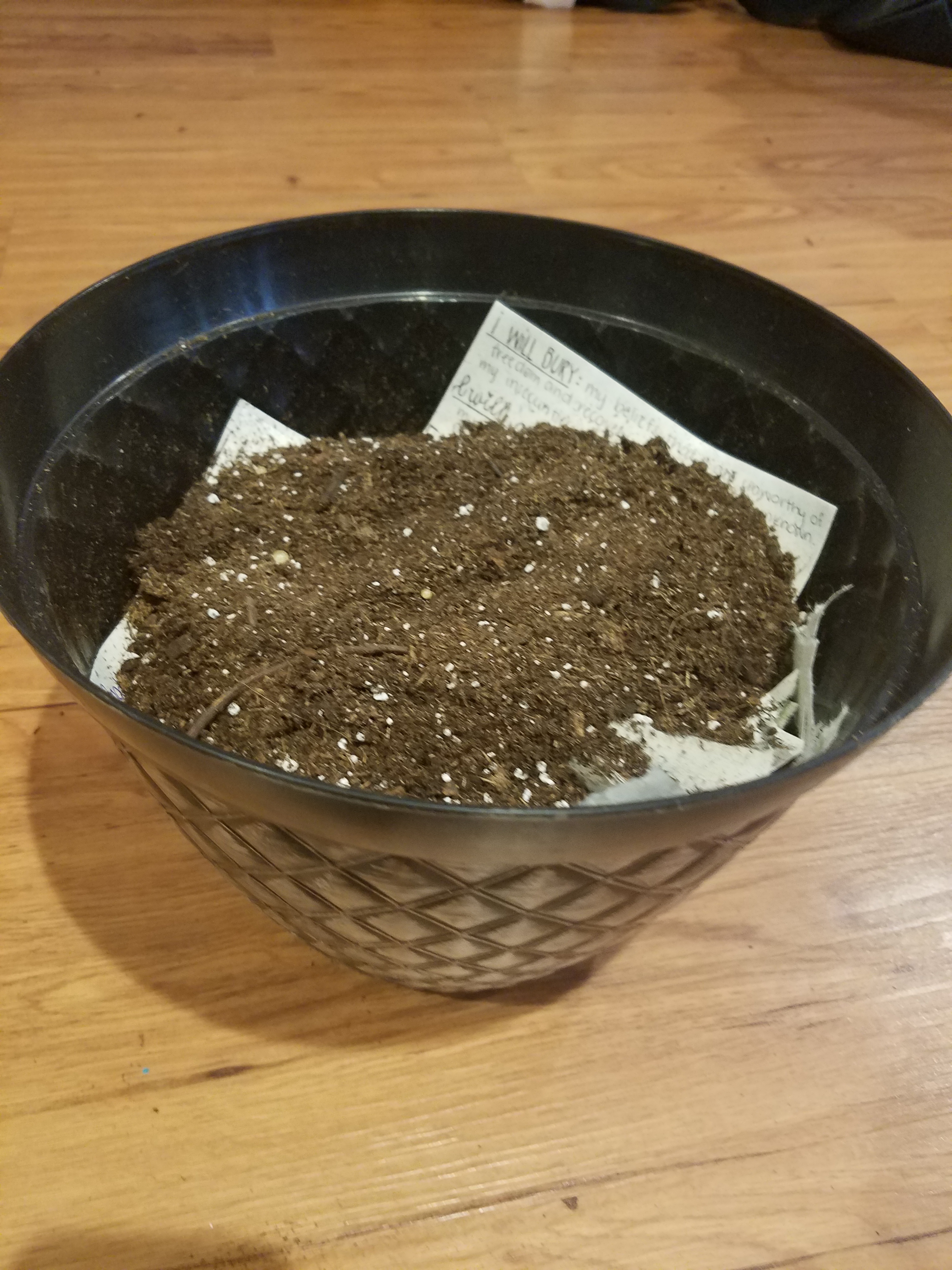“TK Talks” with Camille Williams, MA, NCC, LCPC
Burying an Eating Disorder Nurtures Hope in Recovery
By Camille Williams, MA, NCC, LCPC, Timberline Knolls Eating Disorder Program Coordinator
*Preface: As you read the following blog, please look at the picture included. This picture was taken during an eating disorder therapy group at Timberline Knolls. This group provided women in treatment for an eating disorder (ED) with the opportunity to “bury” their diseases or aspects of their EDs and “plant” hope and seeds in recovery.
ED recovery is a dialectic process because individuals can often experience two opposing experiences simultaneously. It can be terribly painful and is also miraculously healing. It is a grieving process and a process of immense growth. Recovery is about exploring both sides at the same time. Identifying the aspects of the disorder that need to be grieved, let go of, buried. And noticing the slow and transformative beauty that grows with change.
In a recent ED group, women working towards recovery asked to “bury” parts of the disorder. They wanted to let go of the self-hate, the constant criticism, the obsession with food, the obsession with weight. They wanted to grieve the loss of time spent to maladaptive behaviors, the loss of identity and values, the loss of relationships. They were ready and willing to write these things down to identify what they needed to let go of and what was no longer serving them. This process is painful. It is often accompanied by the feelings that are part of the stages of grief. Denial that things are that bad. Anger at self, others, or the ED. Sadness and guilt over neglecting values and disregarding life. Connecting to these feelings of grief actually results in “planting the seeds” of acceptance and change.
As these women “bury” and leave behind the things that are no longer serving them, the things they no longer want to exist with, they are creating space for something new. Part of the challenge in recovery is the hard work and patience required even when it may seem like no growth or change is happening. Someone in recovery from an ED must continue to provide the body with nourishment and continue to address emotional needs that have been neglected. For example, the body may first respond with physical pain and discomfort before progressing to contentment and improved digestive functioning. Emotions may feel extreme and overwhelming before settling into more manageable levels. While the change and discomfort is occurring, the process of feeding the body and the soul must continue. This is similar to a seed; just because there is not a sprout the first day a seed is planted, that doesn’t mean it will not grow. The sunlight, the soil, and the water are still needed and when the seed is ready it will eventually sprout.
As these women nurture and care for the seeds and the grief that has been planted happens, change does start. Maybe it is so small and fragile at first and with continued care and patience it grows stronger and more resilient. Their recovery works this way, too. Burying their eating disorders and the many destructive aspects of it, nurturing the seeds that have been planted each day, leads to a vibrant life full of hope and opportunity. These seeds in recovery can manifest into self-compassion, joy, relationships, creativity, peace, freedom, and a meaningful life. These are the beautiful things that make recovery worth it. This is what is being planted and cultivated each day that recovery is chosen.
I want to leave you with a quote that also demonstrates the grief and transformation that takes place in planting and in recovery: “For a seed to achieve its greatest expression, it must come completely undone. The shell cracks, its insides come out and everything changes. For someone who does not understand growth, it would look like complete destruction” – Cynthia Occelli
TK Contributor: As the Timberline Knolls Eating Disorder Program Coordinator, Camille Williams MA, NCC, LCPC, supports the development of curriculum, supervises the eating disorder specialists, and provides group therapy. She also educates and trains all staff on campus and advocates for eating disorder awareness through publications. Timberline Knolls serves as an iaedp™Presidents Council Member.
*The opinions and views of our guest contributors are shared to provide a broad perspective of eating disorders and not intended as endorsement by iaedp Foundation, Inc. or its Board of Directors.*






